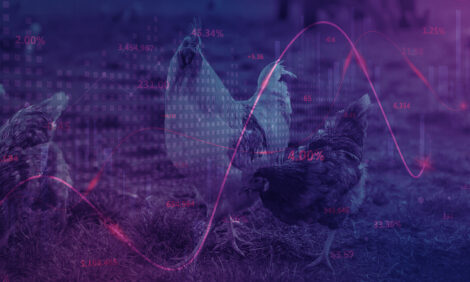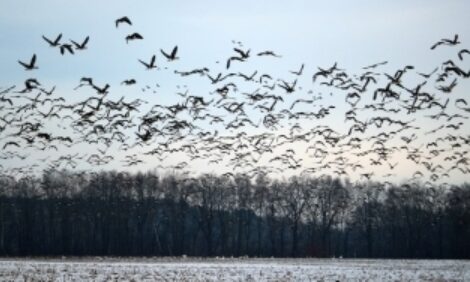



Slaughter, Processing and Sales Guidelines for Small Scale Producers
The inspection status of a poultry slaughter establishment determines where the poultry products can be distributed and sold - this is one of the main focuses of a new report from Iowa State University on poultry slaughter, processing and sales guidelines for small scale producers, writes TheMeatSite Senior Editor, Chris Harris.The report is a guide for Iowa producers with relevance to producers across the US to see how state regulations and directives operate and what limitations there are for marketing.
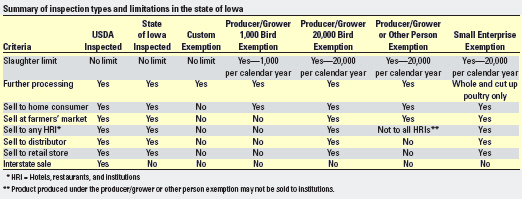
When birds are slaughtered at USDA/FSIS officially inspected plants the product is given the Federal Mark of Inspection and it can be sold across state lines as well as within the state.
The inspection laws mean there has to be both ante and post mortem inspection of all birds by a Federal Meat Inspector, daily inspection and carcase chilling standards are also set down by law.
The premises have to be approved and they have to operate under strict HACCP - Hazard Analysis and Critical Control Point - plans that include a written document outlining the manufacturing processes in the plant and the record keeping used to monitor critical control points for food safety hazards.
The plants also have to operate under Sanitation Standard Operating Procedures (SSOPs) that are documented procedures as to how a plant cleans the processing areas, equipment and surfaces.
However, if a bird is slaughtered in a state inspected plant, the product bears the state inspection mark - in this case the Iowa State Inspection Mark. The products can only be sold within the state (intrastate commerce).
The regulatory requirements include ante and post mortem inspection of all birds by a state meat inspector, daily inspection, chilling standards, state approval of the facilities, HACCP plans and SSOPs as well as approved labelling and certification of portable water, certificates for waste water disposal and full record keeping.
The poultry slaughtered in an official state plant can be sold to consumers, restaurants, institutions and retail outlets in the state.
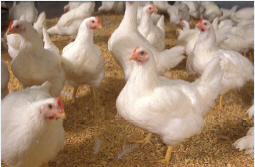
Iowa also has other plants called Custom Exempt facilities, where the bird is not inspected and does not have any marks following slaughter.
In this case, the slaughtered birds are only for use in the household of the producer and non-paying guests.
However, even these facilities have to be approved and need SSOPs as well as approved labelling. Both the waste water and the portable water have to be certified and records have to be kept.
The plants are inspected quarterly on a risk based basis by state inspection staff to make sure the regulatory requirements are met. The poultry cannot be sold.
There are other exemptions where the poultry slaughtered is not inspected and does not have any marks. However, the product may be sold under specific exemptions. The plants and the slaughter regulations are similar to custom exempt plants.
There are three other exemptions that will allow for a licensed facility to handle no more than 20,000 birds per calendar year.
- Producer/Grower Exemption
- Producer/Grower or Other Person Exemption
- Small Enterprise Exemption
The Producer/Grower exemption and the Producer/Grower or Other Person permits slaughter and processing, while the Small Enterprise Exemption permits only slaughter and cutting up.
Sales of these exempt birds are limited by each exemption and are allowed only in the State of Iowa and must follow Regulatory Requirements similar to those for custom exempt plants.
A producer can slaughter up to 1,000 birds per year inn the total of any domesticated poultry on-farm, but this limit is only for birds that have been raised by the producer himself and are only for home use. Poultry processed under this exemption cannot be sold to restaurants, institutions, or retail outlets (including farmers' markets).
A producer can sell live birds to an individual and the new owner/producer can process them for his or her personal use and they are not for sale after processing.
The new owner/producer can have the birds processed at an exempt or official facility and can arrange drop off and the pickup at the processing plant.
Depending on how poultry is to be sold, there are four possible licenses a poultry seller may need from the Iowa Department of Inspections and Appeals, Food and Consumer Safety Bureau.
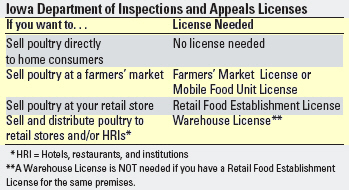
A detailed USDA/FSIS guidance document explaining the requirements and limits of the specific poultry slaughter exemptions can be found at www.fsis.usda.gov/OPPDE/rdad/FSISNotices/Poultry_Slaughter_Exemption_0406.pdf.
Further Reading
| - | You can view the full report by clicking here. |
July 2009







